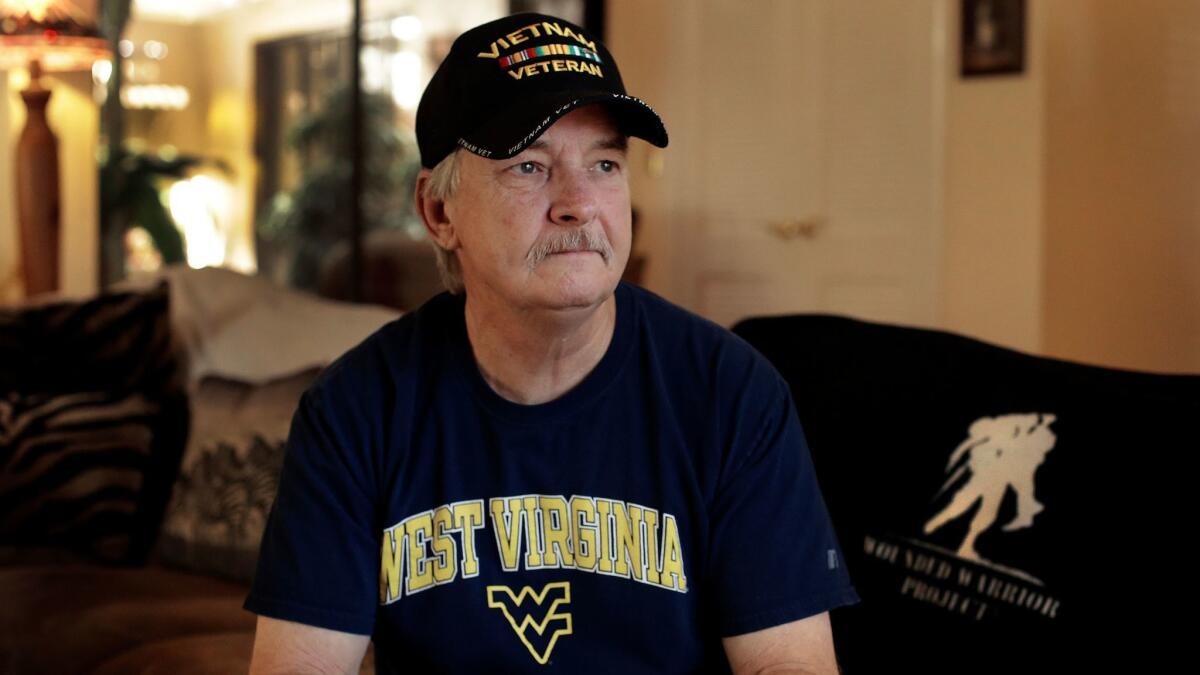They made it home from Vietnam. Now, these vets battle a rare form of cancer

- Share via
Reporting from DANVILLE, Calif. — They were the lucky ones who managed to make it home from Vietnam. Now, half a century later, some veterans are finding out they, too, are victims of the war.
The enemy is a known killer in parts of Asia: parasites ingested in raw or poorly cooked river fish. These liver flukes attach to the lining of the bile duct and, over time, cause inflammation and scarring. Decades after infection, a rare cancer called cholangiocarcinoma can develop. Symptoms typically do not occur until advanced stages.
Ralph Erickson, who heads post-deployment health services at the Department of Veterans Affairs, says about 700 cholangiocarcinoma patients have passed through the agency’s medical system in the last 15 years. In some instances, the government has acknowledged that the illness is “as likely as not” connected to veterans’ time in service. By VA standards, that’s enough to make them eligible for benefits.
Fewer than half of those 700 submitted claims, however, in part because they were unaware of any possible link to their service. Of the claims submitted, 3 out of 4 have been rejected, according to data obtained by the Associated Press through the Freedom of Information Act.
As a result, some veterans are spending their final days fighting the VA. They say they were never told they could be at risk.
I dodged all those bullets, then get killed by a fish.
— Michael Baughman, Vietnam veteran
“Hard to believe,” said veteran Michael Baughman, 64, as he sat in his living room in Danville, Calif., flipping through a photo album from his war days. “I dodged all those bullets, then get killed by a fish.”
Baughman was drafted in late 1970 and did reconnaissance missions near Hue. Thanks partly to growing up hunting in the mountains of West Virginia, he proved gifted at noticing the smallest twig or leaf brushed out of place by the enemy. Walking point and clearing thick jungle with a machete, he was tasked with spotting booby traps and potential ambushes.
Often on long patrols, he said, his unit would run out of rations and go fishing for dinner near the border with Laos.
“We would throw a grenade in the water, and then scoop them off the river floor,” Baughman said. “We called it ‘fish on a stick.’”
The men cooked the makeshift meal as best they could over a tiny, blue smokeless flame, but it never really got done.
He didn’t think much of it, until he went for a long-overdue physical three years ago. His blood work indicated there might be a problem with his liver. Further testing revealed bile duct cancer.
Baughman’s private physician wrote a letter highlighting the connection between liver flukes and bile duct cancer. A VA doctor also acknowledged the parasites are a primary risk factor but was not convinced Baughman’s illness was related to his time in Vietnam.
The veteran’s claims for benefits were denied twice in 2015. He’s awaiting word on his latest appeal.
Liver flukes infect an estimated 25 million people globally. The parasites are found mainly in parts of Southeast Asia, China and South Korea, where residents and tourists alike risk infection from specific types of freshwater fish, such as tilapia and carp.
In the United States, cholangiocarcinoma is extremely rare, with roughly 5,000 people diagnosed each year, including some immigrants from Asia who ate infected fish in their native countries.
VA data, collected following an AP inquiry, show the number of benefit claims for bile duct cancer has increased sixfold since 2003. The requests hit a high of 60 last year, with nearly 80% denied.
Decisions appear to be haphazard. Some are approved automatically. Others, presented with the same evidence, are denied. Some rejections are based on the fact that parasites were not found in stool samples, but those tests were conducted years after the worms would have died.
VA officials said that while they’re sympathetic, it’s up to the men to prove the connection to their time in service. They say because the cancer remains rare, it would be unrealistic and onerous to carry out regular screenings.
“We will look at each case and all the evidence that is presented to us and make a determination at that point,” said Steve Westerfeld, a spokesman for the VA’s Veterans Benefits Administration. “Certainly any veteran has an opportunity to appeal.”
Many do, sometimes two or three times before either getting approved or giving up.
How much veterans, or their families, are compensated depends on many factors. An unmarried veteran can get nearly $3,000 a month, but some spouses said they get about half that amount. For many, it’s not about the money. It’s about raising awareness, both among veterans and in the VA.
If American doctors better understood cholangiocarcinoma and the potential risks to those who served in Vietnam, they could use ultrasound to check veterans for inflammation, and then surgery might be possible for some of them, said Jeff Bethony, a liver fluke expert at George Washington University.
“Early is key,” he said, adding that he regularly receives desperate letters from veterans’ family members. “The VA should be testing for this.”
McDowell and Mason write for the Associated Press.
ALSO
California National Guard says it can’t find 4,000 soldiers who received improper payments
More to Read
Sign up for Essential California
The most important California stories and recommendations in your inbox every morning.
You may occasionally receive promotional content from the Los Angeles Times.










